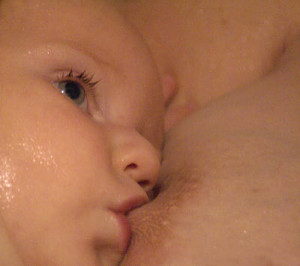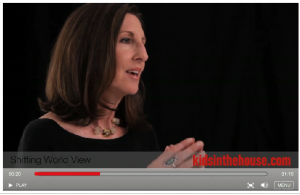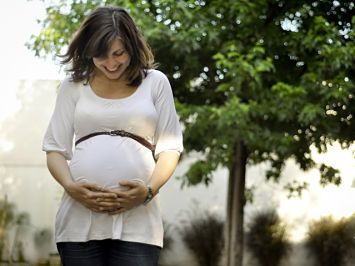 Don’t get me wrong — I’m a huge fan of breastfeeding. I devote swaths of print in Parenting for Peace to the reasons and ways it contributes to raising a peaceful (i.e., empathic, innovative, flexible, self-regulating, and yes, intelligent) generation. But I frankly get annoyed when media trumpets the connection between breastfeeding and IQ, when it is social intelligence we desperately need for the survival of our human family! {Read more at mothering.com}
Don’t get me wrong — I’m a huge fan of breastfeeding. I devote swaths of print in Parenting for Peace to the reasons and ways it contributes to raising a peaceful (i.e., empathic, innovative, flexible, self-regulating, and yes, intelligent) generation. But I frankly get annoyed when media trumpets the connection between breastfeeding and IQ, when it is social intelligence we desperately need for the survival of our human family! {Read more at mothering.com}
Archive for the ‘Parenting for Peace’ Category
Breastfeeding for IQ — Really??
Image
Staying Connected After Birth: A Peaceful Beginning
My life explorations as an adopted person and my studies of the foundations of human wellbeing have consistently turned up a key element of health: the experience of and capacity for connection. Birth presents us a momentous opportunity to foster connection. It is also important to understand the costs of not staying connected after birth — whether it is due to adoption, NICU confinement, health issues in the mother, or other circumstances preventing mother-newborn connectedness. This is not about guilt or blame, but the empowerment that comes with understanding what happens with neonatal separation. {Read the rest of this post at mothering.com}
Image
footloosiety, Flickr | Creative Commons
Slowing the Pace of Life in Summer
 We humans are rhythmic creatures. At least that’s how we’re meant to be. It’s why Rhythm is one of the seven Parenting for Peace principles. It is a gift for our children and ourselves to embrace life’s ebbing and flowing. Summertime offers us a luscious opportunity for slowing the pace of life.
We humans are rhythmic creatures. At least that’s how we’re meant to be. It’s why Rhythm is one of the seven Parenting for Peace principles. It is a gift for our children and ourselves to embrace life’s ebbing and flowing. Summertime offers us a luscious opportunity for slowing the pace of life.
“As biologists have learned in the past decade,” writes author Jennifer Ackerman, “time permeates the flesh of all living things — and for one powerful reason: We evolved on a rotating planet.”[1] She observes the many ways in which we carry inside us a model of the cosmos. Our entire being is steeped in various rhythms: respiration, circulation, digestion, elimination just to name a few.
So no wonder we find rhythmicity so nourishing. The young child most especially thrives on rhythmic routine, consistency and predictability. It weaves a sense of security into the fiber of his very cells as they are busy building brain and organ tissue. Ideally, rhythm permeates the child’s daily, weekly and even seasonal life. Meals and bedtimes are consistent and regular. Activities at home as well as outings take on the predictability of ritual, which the child can count on and keep a sort of internal beat to: “This is when we eat, this is when we nap, this is when we have play time… Tuesdays we go to the park, Wednesdays we go to the Farmer’s Market, Sunday we visit Grandma… and summer is beach time! {Read the rest of this post at mothering.com}
[1] Ackerman, Jennifer. Sex Sleep Eat Drink Dream: A Day in the Life of Your Body. New York: Houghton Mifflin, 2007, pg. 8.
Image:
Petrov Escarião under its Creative Commons license
Parenting for Peace Primer 3-Pack (w/ videos)
 Looking for more parenting peace and harmony? Less stress, fewer meltdowns and more joy? Look no further…but do look, because this features videos!
Looking for more parenting peace and harmony? Less stress, fewer meltdowns and more joy? Look no further…but do look, because this features videos!
Our children learn first and foremost by example — our example. The latest brain science reveals that the circuitry of children’s social brains wires up to mirror their parents’ social-emotional brain functioning. This begins in a very direct, biological manner in infancy, and continues through adolescence.
For this and many other reasons related to the potent teaching power of models, a fruitful question to ask yourself, ideally beginning even before you have a child, is “Am I worthy of my child’s unquestioning imitation?” Daunting, yes. But it’s best to realize early on that whether or not you can answer “Yes” to this question, what you see in the mirror is to a great extent what you will see in your child. And, most likely in your child as an adult.
But don’t despair: Nature seems to have built in a special mechanism that allows us to give our children a fighting chance to surpass us. If our children’s potential was constrained by the limitations of our own accomplishment, we’d be doomed! We’d have to wait until our sixties, seventies, eighties — or maybe never — before we’d feel prepared to be parents. Nature has brilliantly built into the system that our children most powerfully respond to our inner life, and especially to the mental force that results when we continually strive to be more connected, sane and centered. (more…)
The Function of Joy in Pregnancy
 Mothers, some of the most potent parental influence you will have on your child takes place while he or she is still in your womb — so let’s hope that most of your days while pregnant are Happy Mother’s Days! While you are pregnant, your baby’s organs and tissues develop in direct response to lessons they receive about the world. These lessons come from your diet, your behavior and your state of mind — thereby hinting at the function of joy in pregnancy.
Mothers, some of the most potent parental influence you will have on your child takes place while he or she is still in your womb — so let’s hope that most of your days while pregnant are Happy Mother’s Days! While you are pregnant, your baby’s organs and tissues develop in direct response to lessons they receive about the world. These lessons come from your diet, your behavior and your state of mind — thereby hinting at the function of joy in pregnancy.
If there is chronic stress in pregnancy, if a pregnant mother’s thoughts and emotions are persistently negative, if she is experiencing unrelenting anxiety, the internal message — delivered to the developing baby — is, “It’s a dangerous world out there,” regardless of whether or not this is objectively true. The baby’s neural cells and nervous system development will actually mutate (adapt) to prepare for the unsafe environment it perceives it is going to be born into. {Read the rest of this post at mothering.com}
Images:
emilianohorcada under a Creative Commons license
Will You Praise Your Child This Mother’s Day?
 Along with breakfast in bed and maybe some flowers or candy…if you have a young child, you’ll invariably be presented with a handmade present — of course, the best kind. And you won’t care if the colors clash, if the popsicle sticks aren’t straight, if the pasta is coming unglued; your heart will expand, almost painfully, with a gush of love and tenderness unique to the moment. These truly are the most precious gifts! And this is one instance where it is impossible (and unnatural!) not to praise your child. But what about every other day…? When you praise your child, do you really build self-esteem, as many people assume? Or do you unwittingly erode intrinsic motivation, pleasure and self-satisfaction?
Along with breakfast in bed and maybe some flowers or candy…if you have a young child, you’ll invariably be presented with a handmade present — of course, the best kind. And you won’t care if the colors clash, if the popsicle sticks aren’t straight, if the pasta is coming unglued; your heart will expand, almost painfully, with a gush of love and tenderness unique to the moment. These truly are the most precious gifts! And this is one instance where it is impossible (and unnatural!) not to praise your child. But what about every other day…? When you praise your child, do you really build self-esteem, as many people assume? Or do you unwittingly erode intrinsic motivation, pleasure and self-satisfaction?
Somewhere along the way it became generally assumed that praise builds self-esteem, leading to the daily parental litany of “Nice job!” and “Great throw!” and “Gorgeous painting!” and on and on ad nauseum. Pundits call it “affirmation” and “positive feedback.” B.F. Skinner called it “positive reinforcement.” (more…)
From Supermom to Sane & Centered Mom
*** This post is your invitation to an empowering FREE webinar next Wednesday ***
“5 Tools for Transforming from Stressed Out to Sane & Centered”
Wednesday, April 24 | 10am – 11:30am Pacific
I thank you ten times a day for the depth and richness
yet simplicity your work has introduced into our already
thriving little family. ~ Elizabeth Bolden, mother of two sons
It seems epidemic these days: an undercurrent of stress and anxiety thrums at the heart of parenting, even for the most “conscious” parents (and probably even more for the really conscious, attuned ones — ever more conscious and attuned to our shortcomings!)
How about you — do you feel this parenting stress? Do you perpetually feel like you’re a just a little behind the 8-ball, missing some crucial opportunity that’s going to put your child behind? Yikes, we didn’t play Mozart through speakers on our pregnant belly… we didn’t use the latest pre-reading iPad app… we didn’t get in on that whiz-bang college-prep (or high-school prep, or for that matter, pre-school prep) program! (more…)

 I include many guidelines about what to say and what not to say to your children in my book Parenting for Peace, but have never gathered them into one user-friendly post. And yet many parents find this level of specificity (“Say this, do not say this”) to be the most helpful of all. It is often the “way in” to a deeper understanding of the nuances and philosophy underlying the seven Parenting for Peace principles. (Yikes — I just realized that in a year of blogging since my book came out, I’ve yet to write a post just about the seven principles. Hard to believe! That will be coming soon…)
I include many guidelines about what to say and what not to say to your children in my book Parenting for Peace, but have never gathered them into one user-friendly post. And yet many parents find this level of specificity (“Say this, do not say this”) to be the most helpful of all. It is often the “way in” to a deeper understanding of the nuances and philosophy underlying the seven Parenting for Peace principles. (Yikes — I just realized that in a year of blogging since my book came out, I’ve yet to write a post just about the seven principles. Hard to believe! That will be coming soon…)


